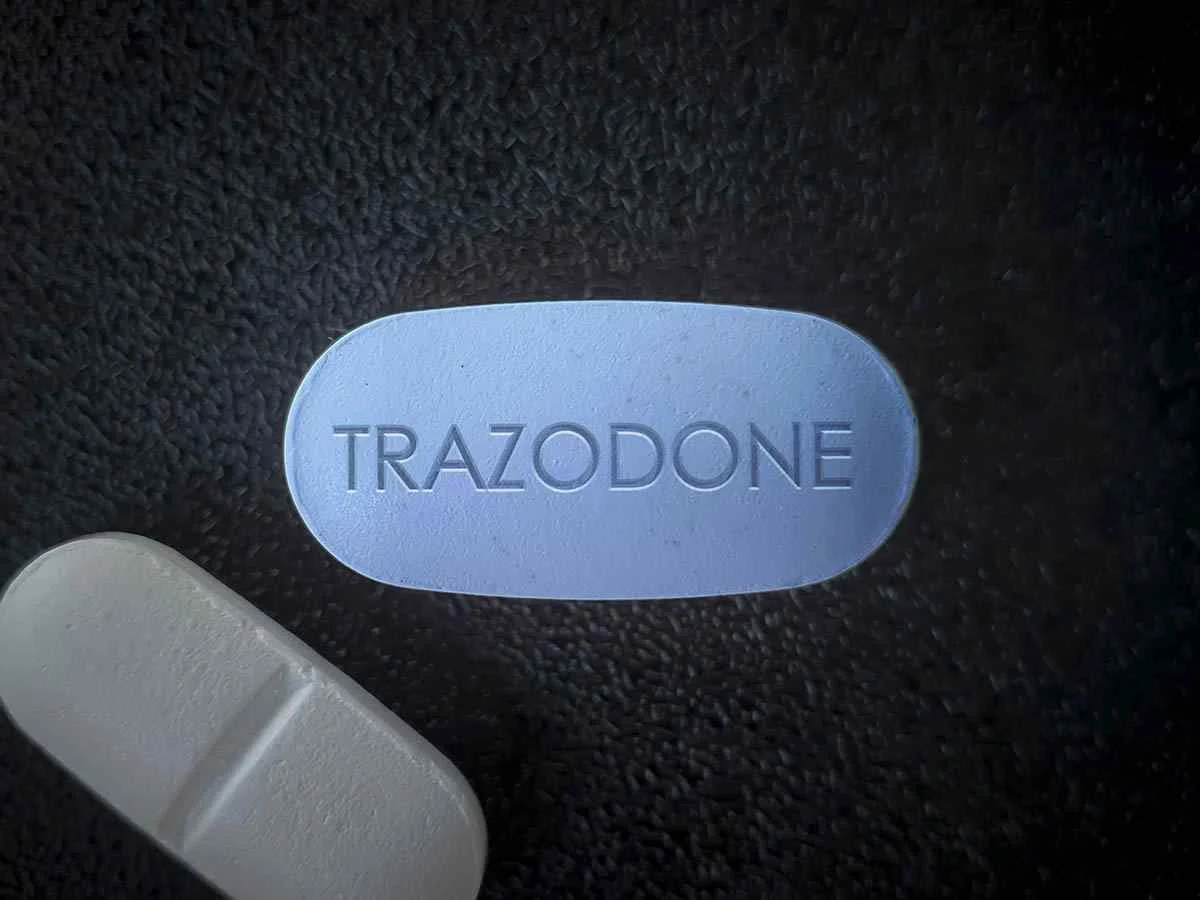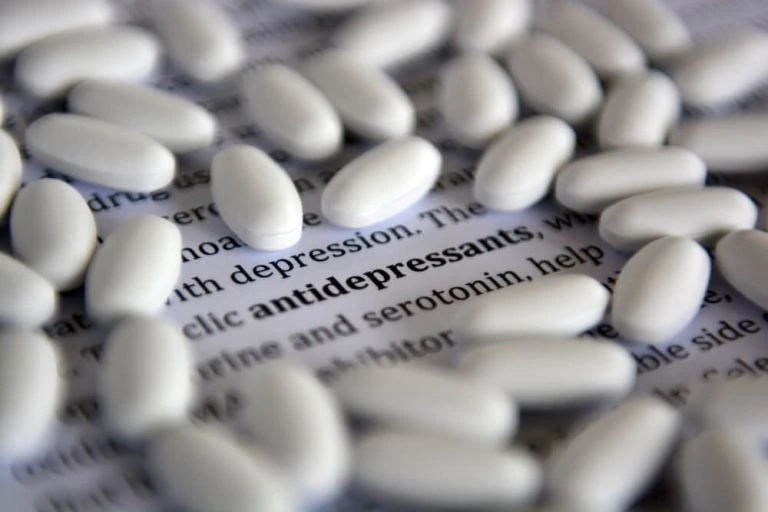Trazodone
Trazodone is an antidepressant that is FDA-approved for the treatment of major depressive disorder (MDD).

Common Brand Names: Desyrel, Desyrel Dividose, Oleptro, Trazodone D, Trialodine
Trazodone is currently only available on prescription in the United States. Though it is mainly used to manage and treat major depression, primary care and mental health providers also frequently employed it as a sleep aid and as a treatment for schizophrenia and anxiety.
Trazodone is classified as a SARI drug (serotonin antagonist and reuptake inhibitors), along with other drugs such as etoperidone and mepiprazole. Although its precise mechanism of action is not fully known, it has principally been observed to slow serotonin reuptake, the process by which serotonin (a key hormone responsible for regulating mood and feelings of well-being) is reused by the nerve cells that produce it. These inhibitory properties, in turn, leave more active serotonin available to stimulate other nerves.
Medical Uses of Trazodone
As a treatment for depression, trazodone may be employed as a monotherapy or used in conjunction with other drugs or psychotherapeutic interventions. Though it does also see some common use as a sedative for patients with sleep issues, trazodone is not FDA-approved for this purpose at present due to a lack of credible clinical data supporting its use as a sleep aid.
Other psychiatric and medical conditions for which trazodone is sometimes used off-label include but are not limited to the following:
- Eating disorders
- Anxiety disorders
- Substance use disorder
- Post-traumatic stress disorder (PTSD)
- Obsessive-compulsive disorder
How Can Trazodone Be Abused or Misused?
Trazodone is not currently listed as a controlled substance by the FDA. Although the particular abuse potential of trazodone has yet to be systematically evaluated by multiple preclinical or clinical studies, existing studies featuring the drug have revealed no indication that it is potentially addictive or habit-forming. While the extant literature on the subject suggests that risk of trazodone abuse is generally low, it should be noted that this conclusion has yet to be conclusively verified for subjects with histories of alcohol or drug abuse.
Due to its sedative properties, trazodone does retain some potential for misuse in rare cases, such as when it is taken recreationally, at doses above recommended levels, or for longer periods of time than originally prescribed.
Trazodone Drug Interactions and Contraindications
Individuals prescribing or being prescribed trazodone, as well as those who might attempt to misuse the drug, should be aware that it has been found to exhibit clinically important interactions with the following substances:
- Monoamine oxidase inhibitors (MAOIs): These drugs inhibit the body’s metabolism of serotonin and can thus be used to treat depression. Using MAOIs concomitantly with serotonergic drugs like trazodone, however, carries a high risk of serotonin syndrome. Because serotonin syndrome can be a serious, potentially life-threatening condition, trazodone is contraindicated in patients already taking MAOIs.
- Other serotonergic drugs: Using trazodone in conjunction with other serotonergic drugs, such as tramadol, buspirone, and St. John’s Wort, can also increase the risk of serotonin syndrome.
- Anticoagulants and antiplatelet agents: Platelets release serotonin to aid in hemostasis, the mechanism by which bleeding from damaged blood vessels is controlled and eventually stopped. Using antiplatelet agents or anticoagulants with trazadone could thus render patients more susceptible to bleeding.
- Strong CYP3A4 inhibitors: The enzyme CYP3A4 is primarily responsible for the metabolism of many foreign substances that enter the body, including trazodone. Hence, trazodone may interact with other medications that influence the activity levels of CYP3A4. In particular, CYP3A4 inhibitors such as itraconazole and clarithromycin may increase concentrations of trazodone in the body and lead to adverse effects such as cardiac arrhythmias.
- Strong CYP3A4 inducers: Conversely, concomitant use of trazodone and potent CYP3A4 inducers may decrease trazodone concentrations in the body and diminish the drug’s effect. Some examples of CYP3A4 inducers include rifampin and carbamazepine.
- Digoxin and phenytoin: Digoxin and phenytoin are narrow therapeutic index drugs, which means that small changes in their dosage or blood concentration levels can give rise to severe and even possibly deadly drug reactions. Concomitant use of trazodone can lead to elevated levels of digoxin and phenytoin in the blood.
- Central nervous system (CNS) depressants: Trazodone can amplify a patient’s response to central nervous system depressants like cough and cold medication, allergy medication, alcohol, and barbiturates. Some symptoms that patients are likely to experience at greater intensity when taking CNS depressants with trazodone include drowsiness, dizziness, and lightheadedness.
- QT interval prolongation: Simultaneous use of trazodone and drugs that prolong the QT interval may place individuals at significant risk for cardiac arrhythmias.
In addition, trazodone has been shown to carry some risk for causing congenital abnormalities and other adverse effects on the fetus in animal test subjects. In light of this, pregnant women are typically advised against taking the drug. Young individuals are also advised against using the drug because of an increased risk for suicidal ideation.
Adverse Effects of Taking Trazodone
Possible adverse effects a patient may experience when taking trazodone include the following:
- Headaches
- Fatigue
- Dizziness
- Drowsiness
- Dry mouth
- Suicidal thoughts, particularly in young adults, adolescents, and children
- Orthostatic hypotension, a form of low blood pressure that may lead to dizziness, lightheadedness or fainting, especially in elderly patients
- Priapism, or painful, protracted penile erections
In addition to the above, the following symptoms indicate a serious adverse reaction to trazodone:
- Chest pain
- Shortness of breath
- Abnormal bruising or bleeding
- Elevated, pounding heartbeat
- Irregular heartbeat
- Loss of consciousness, whether temporary or protracted
- Seizures
If you observe these symptoms in yourself or another individual who may be abusing or medicating on trazodone, contact your doctor or emergency medical services immediately. Likewise, don’t hesitate to report any other unusual symptoms or problems you might experience when taking the drug.
Identifying Signs of Trazodone Overdose
Taking more than the recommended amount of trazodone, whether by accident or deliberately, can lead to overdose. Important signs and symptoms of trazodone overdose include the following:
- Tremors and shaking sensations
- Loss of body coordination
- Priapism
- Insomnia
- Irregular heartbeat
- Abnormally slow heartbeat
- Chest pain
- Low blood pressure
- Labored breathing
- No breathing
- Fainting
- Lack of responsiveness when unconscious (coma)
Seek emergency medical attention for any individual experiencing a trazodone overdose immediately. As much as possible, have the following information ready before calling emergency services:
- The affected person’s age, weight, and existing health conditions
- The amount of trazodone swallowed, if known
- The time of trazodone intake, if known
- Whether the person had been prescribed trazodone, as well as the specific prescription details if known
- Whether the person has been abusing trazodone or other substances, if known
Do not attempt to induce vomiting unless explicitly advised to do so by a healthcare provider or poison control expert. They will give you further instructions on what to do for the patient while waiting for professional help to arrive.
Getting Treatment for Trazodone Abuse
If you’ve been taking trazodone in higher doses, for longer intervals than recommended by your doctor, or with other substances, you may likely be suffering from a substance abuse problem. In light of this, it’s probably high time to reconsider your relationship with the drug. Dedicated medical professionals can help you come up with a comprehensive plan to curb your reliance on trazodone or any other drug and help you take the necessary first steps toward recovery.
If you’re seeking rehabilitation options for individuals with substance abuse issues, whether for yourself or a loved one, you can normally expect to have a choice between the following two treatment setups:
- Inpatient treatment: This highly intensive treatment option is recommended for patients with severe substance abuse problems who require high levels of professional support and regular monitoring. If you have on-occuring substance use disorders or mental health issues, your doctor may recommend this setup. Should you choose to undergo inpatient treatment, you will live at the rehabilitation facility where you may receive a mix of therapeutic interventions, including medications, individual and group counseling, behavioral therapy, and drug education sessions. These therapies are designed to help your mind and body recover from the immediate effects of substance abuse, as well as to teach you how to recognize and cope healthily with relapse triggers, manage cravings, and develop solid drug refusal habits.
- Outpatient treatment: Patients engaged in outpatient treatment will continue to live at home while committing to regular counseling and therapy sessions at their treatment center. As this is the less intensive of the two treatment options, it’s best for people with milder conditions, particularly those who are well-supported on the outside by friends and family members. Outpatient treatment affords you the freedom to continue attending to your most important daily obligations, such as school and work.
Get in Touch with a Recovery Support Advisor Today
Deciding to get help is the first crucial step a person can take toward overcoming a substance abuse problem. If you’re worried about financing your treatment, you can take comfort in the fact that most insurance providers offer a level of coverage for substance abuse rehabilitation services. And even if you don’t currently have an insurance plan, a professional recovery support advisor can recommend a wealth of other ways to fund your treatment.
Call Better Addiction Care today at (800) 429-7690 and our advisors will be glad to help you verify your insurance. They can also walk you through the process of choosing a treatment center that’s appropriate for your condition and current financial situation.
A Look into the History of Trazodone
Trazodone was first synthesized in Italy in the 1960’s by researchers under the Angelini Group. At its inception, the drug had been developed in line with the mental pain hypothesis, a theory that proposed a connection between major depression and a decreased pain threshold in affected patients. This theory postulated that the same mechanisms, in essence, were responsible for subjects’ experiences of both mental and physical pain.
Trazodone was approved by the FDA in 1981 and is distinguished as the first non-tricyclic antidepressant to be registered for use in the United States. Today, it is marketed and sold in many countries all over the world, including in the US and in a number of European and Latin American countries.







